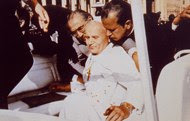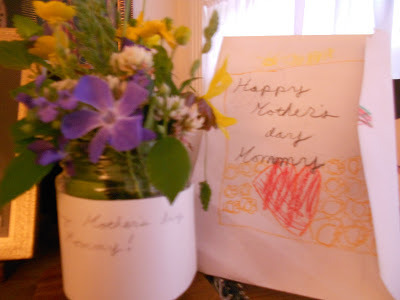John Janaro's Blog, page 297
May 15, 2013
John 14-16: Reading and "Dwelling" With the Text
 The Abbey chapel at BerryvilleIn recent weeks, the Gospel for the day has been taken from what is sometimes called the "farewell discourse" of Jesus in John, chapters 14, 15, and 16. Many classic verses are found here. "I am the way, and the truth, and the life" (14:6). "Whoever has seen me has seen the Father" (14:9). "I am the vine; you are the branches... apart from me you can do nothing" (15:5). Then there are those words about His gift of His peace, and bearing abundant fruit, and exhortations to "abide in Him" and "keep His commands," and especially "this is my commandment: that you love one another as I have loved you" (5:12).
The Abbey chapel at BerryvilleIn recent weeks, the Gospel for the day has been taken from what is sometimes called the "farewell discourse" of Jesus in John, chapters 14, 15, and 16. Many classic verses are found here. "I am the way, and the truth, and the life" (14:6). "Whoever has seen me has seen the Father" (14:9). "I am the vine; you are the branches... apart from me you can do nothing" (15:5). Then there are those words about His gift of His peace, and bearing abundant fruit, and exhortations to "abide in Him" and "keep His commands," and especially "this is my commandment: that you love one another as I have loved you" (5:12).This part of the Gospel is so rich; indeed it is quite overwhelming. It takes about twenty minutes at the very least to read the three chapters continuously with attention. I should know. For almost a decade my spiritual father was an old Cistercian monk at Holy Cross Abbey in Berryville, Virginia. Fr. Edward died last year, and I still have to devote a post to him (which I will do soon). Right now, I mention him because he always gave the same penance for confession: the prayerful reading of John 14-16.
This seems like a bit more of a time-and-effort investment than most penances, but I am grateful for the frequent reading of this text, and what I feel inclined to call "learning to dwell with it." This is a profound exchange between Jesus and the disciples. As is so often the case, the disciples don't understand. Jesus uses these great images that are familiar to us, but the disciples are confused. Jesus speaks of Himself, His Father, the Spirit, the world, the disciples, and they are not quite sure what he means by all of it. When we read these texts, we are dazzled, but we sympathize with the disciples in a certain way.
Maybe we have studied the Bible for years, but do we really "get it"?
"We do not know what he is talking about" (16:18) the disciples are saying near the end of chapter 16. Two thousand years later, we can still appreciate their perplexity. We too may wonder, "What is He talking about?" We have the development of doctrine, and the tradition and the Fathers, and many good modern commentaries, and our own prayerful reading in the light of the Holy Spirit. It remains an awesome and beautiful mystery, and it brings us more and more to a simple gaze full of silence, adoration, and love. We are drawn to "abide" in Him, and allow Him to dwell in us, with the Father and the Spirit.
But just then comes a moment in the text when the clouds seem to open for the disciples. What happens in this contemplative dialogue that breaks through and appears, even if only for a moment, in their minds and hearts?
Jesus says:
"I have said these things to you in figures of speech. The hour is coming when I will no longer speak to you in figures, but will tell you plainly of the Father. On that day you will ask in my name. I do not say to you that I will ask the Father on your behalf; for the Father himself loves you, because you have loved me and have believed that I came from God" (16:25-27).And then He says a single verse that sounds like something He has already said many times. Yet this time it stands out; it seems to touch the disciples for the first time in all its richness. If we ponder it for awhile, we might be touched by it too. Jesus says:
"I came from the Father and have come into the world; again, I am leaving the world and am going to the Father" (16:28).The hitherto bewildered disciples seem suddenly awakened by these words. Perhaps they don't know what they are saying, and yet they are impressed with a luminous certainty, as if they are standing before Jesus transfigured. They are greatly consoled and illuminated. Suddenly they rejoice, and cry out with a newly found joy.
"His disciples said, 'Yes, now you are speaking plainly, not in any figure of speech! Now we know that you know all things, and do not need to have anyone question you; by this we believe that you came from God'" (16:29-30).Perhaps we reach this point and wonder what we've missed. What did Jesus say that suddenly made it all clear?
I wonder if these words might indicate the very heart of the matter. The Son comes forth from the Father and, with the Father, breathes forth the Holy Spirit. And Jesus has come into the world above all to reveal and glorify the mystery of the Holy Trinity, the mystery of the God who is Eternal Love. "I came from the Father and have come into the world; again, I am leaving the world and am going to the Father."
Perhaps these words open the hearts of the disciples to Jesus's relation to the Father in the Spirit. Perhaps they grasp that His whole mission is to "open up" the life of God so that they may share that life through Him. Still, Jesus knows that His coming and going has not yet reached its definitive moment. The Cross remains before Him:
Jesus answered them, "Do you now believe? The hour is coming, indeed it has come, when you will be scattered, each one to his home, and you will leave me alone. Yet I am not alone because the Father is with me. I have said this to you, so that in me you may have peace. In the world you face persecution. But take courage; I have conquered the world!" (16:31-33)
Published on May 15, 2013 14:30
May 13, 2013
May 13, 1981: On the Edge of the End of the World
 Blood on the white cassock of Blessed John Paul IIMay 13th commemorates the first appearance of the Virgin Mary to the three children of Fatima, Portugal in the year 1917. May 13th is also a day that commemorates another event, an event undoubtedly linked to that other afternoon in 1917, an event which remains so vivid in my memory. Every year, I remember May 13, 1981.
Blood on the white cassock of Blessed John Paul IIMay 13th commemorates the first appearance of the Virgin Mary to the three children of Fatima, Portugal in the year 1917. May 13th is also a day that commemorates another event, an event undoubtedly linked to that other afternoon in 1917, an event which remains so vivid in my memory. Every year, I remember May 13, 1981.An 18 year old boy, a few weeks from graduation from public high school, walking through the noisy hallway. It was around lunchtime in America. More than two thousand kids were in motion in the halls of that school. Not many of them were Catholic. I was going to my "home room" classroom. I can still see the door in my mind. I can see the hallway. I am almost ready to reach for the door. Its something I've done hundreds of time; its almost automatic....
And here is Christine (she was also Catholic, nice girl... no I didn't have a crush on her) and she is in shock. Here face is pale, so pale....
"The Pope has been shot."
It was about the strangest thing anyone had ever said to me in my young life. "What?"
Thirty two years ago, what were you doing on that afternoon? Where were you when you found out?
After this, my memory blurs. What happened to the rest of the school day? At some point, we were all in our various classrooms watching the news reports. The routine was utterly broken. The heads and the jocks, the smart kids, the nerds, the heavy metal kids, the tough kids, girls and boys, all kinds of ethnic backgrounds, kids with all kinds of beliefs and ideologies and adolescent confusion, students and teachers too: we all watched the television and we were just people, just frail people holding onto our own lives by the thinnest of threads.
On television, the newscasters (themselves visibly disturbed) described with diagrams the surgery that was to take place. All over the world people prayed. I felt numb, with people I had known for the last four years without ever really knowing them, in a classroom of a large public school watching the TV that was on in the room. Did I pray?
My Jewish friends wept, and hugged me, as if it were my own father (and it was). Kids who called themselves atheists sat with their heads in their hands. It was like everyone's heart was trying to pray, somehow. Everyone was suffering.
The human race was attacked on May 13, 1981. Somewhere in their depths, people knew it. They felt it.
History was riding a bullet fired at close range into a man's abdomen by a professional assassin who knew what he was doing. He never missed. And on that day, he didn't miss.
But “It was a mother's hand that guided the bullet's path,” the Pope said later.
Can you possibly imagine what the world would be like -- what your own life would be like -- if that bullet had not been guided by a mother's hand thirty two years ago, on this day?
Our Lady of Fatima, thank you for saving the life of Blessed John Paul II!
Published on May 13, 2013 20:30
May 12, 2013
I Asked Her What She Wanted For Mother's Day. She Said....
Mother's Day was lovely for all of us.
 Garden flowers, and Jojo's card, I think. Someone else must have done the writing
Garden flowers, and Jojo's card, I think. Someone else must have done the writing
I asked Eileen what she wanted from the kids for Mother's Day, and she said, "Cooperation!"
 I gave her a pot of yellow daisies.
I gave her a pot of yellow daisies.
And she got (mostly) cooperation too. Some of the girls picked flowers from outside, and made cards. And Teresa cooked her a nice breakfast (not in bed, but in a comfy chair in the living room). The house was pretty clean. I should have taken pictures of this rare occurrence. To actually see the floor in the living room is like seeing a lunar eclipse, hahahaha... heh... uh.
My parents came (along with "Uncle" Walter) and visited for the afternoon. My own dear mother. She means more to me than I can ever express. And she has been a mother to me in every phase of my life. That is what parenthood is supposed to be like, I think. The modes of involvement change, but the relationship remains as a foundation. It is good to have moments like Mother's Day to pause and appreciate what is being given to us right now.
So my parents and Walter came, and we all started yacking away and interrupting one another, Italian style (I'm not sure Eileen is used to this yet, even after 17 years).
Eileen had a happy Mother's Day. She has a realism that enables her to be happy. She's grateful for things, she has a sense of priorities, she remembers Christ and His great and loving purpose for her life. This doesn't mean that the usual family chaos doesn't drive her crazy. And she expects her husband to do everything he can to stay SANE. Thank God for that.
Thank God for her, in so many ways!
Of course, we had dinner too. The meal was provided with fresh ingredients and loving care... by Papa John's! PIZZA!

For advertising like this, we deserve some free pizza!
I hope it was a Happy Mother's Day for everyone! You are all heroines. God bless you!
 Garden flowers, and Jojo's card, I think. Someone else must have done the writing
Garden flowers, and Jojo's card, I think. Someone else must have done the writingI asked Eileen what she wanted from the kids for Mother's Day, and she said, "Cooperation!"
 I gave her a pot of yellow daisies.
I gave her a pot of yellow daisies.And she got (mostly) cooperation too. Some of the girls picked flowers from outside, and made cards. And Teresa cooked her a nice breakfast (not in bed, but in a comfy chair in the living room). The house was pretty clean. I should have taken pictures of this rare occurrence. To actually see the floor in the living room is like seeing a lunar eclipse, hahahaha... heh... uh.
My parents came (along with "Uncle" Walter) and visited for the afternoon. My own dear mother. She means more to me than I can ever express. And she has been a mother to me in every phase of my life. That is what parenthood is supposed to be like, I think. The modes of involvement change, but the relationship remains as a foundation. It is good to have moments like Mother's Day to pause and appreciate what is being given to us right now.
So my parents and Walter came, and we all started yacking away and interrupting one another, Italian style (I'm not sure Eileen is used to this yet, even after 17 years).
Eileen had a happy Mother's Day. She has a realism that enables her to be happy. She's grateful for things, she has a sense of priorities, she remembers Christ and His great and loving purpose for her life. This doesn't mean that the usual family chaos doesn't drive her crazy. And she expects her husband to do everything he can to stay SANE. Thank God for that.
Thank God for her, in so many ways!
Of course, we had dinner too. The meal was provided with fresh ingredients and loving care... by Papa John's! PIZZA!

For advertising like this, we deserve some free pizza!
I hope it was a Happy Mother's Day for everyone! You are all heroines. God bless you!
Published on May 12, 2013 20:00
May 11, 2013
Using Our Talents For Love
 God gives each of us talents, which He wants us to "invest" in life. Our talents are concrete capacities to love, and He gives them to us so that we might each grow in His image and likeness, so that we might fill the universe with the love He has bestowed on us, the love that creates and sustains each on of us in this very moment, the love of He who is Love. He makes us capable of recognizing Him with gratitude and wonder, and reflecting His Love in every circumstance. Our talents help shape our personal, particular ways of loving God and loving our brothers and sisters.
God gives each of us talents, which He wants us to "invest" in life. Our talents are concrete capacities to love, and He gives them to us so that we might each grow in His image and likeness, so that we might fill the universe with the love He has bestowed on us, the love that creates and sustains each on of us in this very moment, the love of He who is Love. He makes us capable of recognizing Him with gratitude and wonder, and reflecting His Love in every circumstance. Our talents help shape our personal, particular ways of loving God and loving our brothers and sisters.Loving means loving. It means giving what I have received. It means giving myself, in this moment, to the person or persons who have been entrusted to me, as a husband and father first, and then also in the use of my particular talents to serve others and build up the good. So, if I'm "busy" with things -- if I am speaking or writing or communicating on the internet or on my blog, or sitting in a library surrounded by old fashioned books and paper, or presenting a lecture in a hall or a classroom -- I must ask myself, "Why am I here? Am I here to give myself, or to build up and enrich my capacity to give? Am I here for love? Or am I just here to show off? To exercise my ego? To dissipate myself in an exchange of information that is really just sophisticated gossip?"
At this moment, I'm trying to write. But my writing is worthless unless it is an act of giving myself to those I hope will read it. Is this a gift of myself? I want it to be; I pray that it might be thus, even though I find myself so easily sidetracked, derailed, or just mixed up in this work and in everything else I do.
Many of us are like this. We offer ourselves in love and witness, but we find ourselves afflicted with so many obstacles: we have our own daily struggles, we are sick, we are tired, we are stressed out.
We must bring all of it to the One who holds us in His love.
Perhaps we feel that our love is only a poor imitation of the love we have received, that our love is all mixed up with self-promotion and vanity. And indeed it is. Let's love anyway. Let's do what we can, and also nourish ourselves continually at the places where we find Him who has loved us.
Indeed, we must let Him love us, through the Church, through the sacraments, through prayer, through our brothers and sisters, through the very truth and goodness of the joys and the sufferings of life. It all belongs to Him, and it is all the work of His great and mysterious love for us and our destiny. In His love we will find the strength to give ourselves, and to give Him to others.
Published on May 11, 2013 18:30
May 10, 2013
"Ask and You Will Receive" - My Text for the Day from Magnificat
 God wants us to grow in prayer. Suffering and tribulation are a school for that. When we are sick, we often don’t feel that the quality of our prayer is improving. In fact, it can seem quite the opposite. When I am in pain, or in depression, or in obsessive fear, my mind feels as if it's tied in knots. I can’t lift my mind to anything, much less God.
God wants us to grow in prayer. Suffering and tribulation are a school for that. When we are sick, we often don’t feel that the quality of our prayer is improving. In fact, it can seem quite the opposite. When I am in pain, or in depression, or in obsessive fear, my mind feels as if it's tied in knots. I can’t lift my mind to anything, much less God.Prayer is conversation with God, and it is God who initiates the conversation. That does not mean that we should wait until God starts speaking inside our heads. He is always speaking, calling to us, drawing us to prayer. He speaks to our hearts. We begin to hear Him when we become more aware of our need for Him. This is where prayer begins: when our hearts cry out, “Lord, have mercy on me!”
We always need mercy, but the awareness of that need arises and intensifies when we are suffering. One of the things that has helped me to see the mercy of God at work in my own suffering is the fact that it has forced me to shut up and listen. The “ear of the heart” that hears God has a very simple shape.
The cry of that heart is also simple: “Help. Have mercy on me. I need You.” We may not be able to articulate these words, but that inward groaning that seeks Him is the foundational response to the love He is continually offering to us.
We are so dear to God in our weakness. He is so close to us when we are suffering. He lifts us closer to Him if we allow Him to enter inside of that need that groans within us. He shapes us, in His way, and in His time.
--published in Magnificat, May 2013
John Janaro is the author of Never Give Up: My Life and God's Mercy, a book which has brought strength and help to many who suffer from physical or mental illness, and others who struggle with the trials of ordinary life.
Published on May 10, 2013 20:00
May 8, 2013
The Holy Spirit, Patience, and Crazy People
"Being patient: that is the path that Jesus also teaches us Christians. Being patient ... This does not mean being sad. No, no, it's another thing! This means bearing, carrying the weight of difficulties, the weight of contradictions, the weight of tribulations on our shoulders. This Christian attitude of bearing up: of being patient."
 Thus said Pope Francis yesterday in another of his splendid homilies. The Christian bears tribulations with patience. The Christian does not complain. The Christian bears suffering and sorrow, but is never sad. (Never sad? Really? More on this below.) The heart is at peace. It is not a good Christian attitude to be "Signore o Signora Lamentela" (which has generally been translated as "Mr. or Mrs. Whiner" -- my impression from the Italian press is that he actually "coined" another one there, the latest of his special and vivid idioms).
Thus said Pope Francis yesterday in another of his splendid homilies. The Christian bears tribulations with patience. The Christian does not complain. The Christian bears suffering and sorrow, but is never sad. (Never sad? Really? More on this below.) The heart is at peace. It is not a good Christian attitude to be "Signore o Signora Lamentela" (which has generally been translated as "Mr. or Mrs. Whiner" -- my impression from the Italian press is that he actually "coined" another one there, the latest of his special and vivid idioms).The first thing that struck me, of course, is that I a m Mr. Whiner. For many years I was also Mr. "I-want-everybody-to-like-me," so I kept the whining inside myself and pretended to be brave. As a person gets older, however, Mr. "like-me" increasingly fades away. You learn by experience that you can twist yourself into a pretzel for some people and they still won't like you. And you no longer have the energy to do the pretzel routine. At this point, Mr. Whiner starts to show himself.
In the 21st century, Mr. Whiner might even dedicate an entire blog to whining. And he's amazed that some people actually keep reading it! I suppose it helps if Mr. Whiner features some stories about his funny family. They are, of course, the ones who keep him from becoming Mr. "Put-me-in-a-rubber-room."
Okay, enough whining about the fact that I'm a whiner.
Pope Frank emphasizes that he is talking about patient endurance, which is founded on the new life that we receive in the Holy Spirit when we are baptized into Christ. If the Holy Spirit dwells in us, we have the radical potential to patiently endure our trials, to live them within the redeeming death and resurrection of Christ.
Frank refers specifically to the term in the Greek New Testament: Hypomone. The sense of this term is to bear up "under" our difficulties with an awareness, a determination to keep going forward toward the goal that gives meaning to all of it (the goal in this case being supernatural, eternal life, the fullness of maturity in Christ, which means that hypomone is the working of grace, a gift that not only calls for the cooperation of our freedom, but also elevates, empowers, and attracts our freedom).
Hypomone says "never give up!"
It enables us to grasp in faith, hope and love, and in the light of the Holy Spirit, the destiny to which we are called. We grasp the reason why we must "never give up," why we must keep going forward. It is a grasp "in love," which may not manifest itself clearly in our understanding. Hence there can be "dark nights" and all sorts of strange and secret paths on which people are patiently bearing their burdens, especially when those burdens involve cognitive and emotional and (to be quite precise) neurological incoherence.
It is important to emphasize this supernatural grace of the Holy Spirit by which we are enabled to bear any kind of crazy problem with patient endurance. It is also true that grace perfects nature, and the tendency of the Christian life is to transform our entire personality. Thus it is not surprising that we meet people in the world who possess Christian joy and patient endurance in a way that is obvious, that is visible and "tangible" to pretty much everyone.
How great and significant such Christian witness is in this world! But it should not surprise us. The life of grace is the beginning of eternal life, which is destined to heal and transform everything.
If we look with attention, however, we may also find this joy and endurance in hard and peculiar places. We may find it mixed with the symptoms of the burdens it bears. We may be distracted from it by the rawness of the wounds that are borne, the physical or mental ugliness of the affliction, or the madness of delusion, confusion and crazy total love that has characterized the holy fools throughout history. All God looks for is an open heart. He'll work with anything that doesn't oppose Him. If He could make children of Abraham from stones, He certainly can take badly broken human beings, failures, oddballs, beggars, crazies, and raise up exotic masterpieces of holiness.
Never look down on any human being. God loves each and every one of them with a persistence and an intensity beyond anything we can imagine.
As Pope Frank says, this life of grace is a "process," and it takes a unique shape in each person's life, and in accordance with their concrete vocation, the burdens they bear, and the sufferings they must endure.
"This is a process - allow me this word 'process' - a process of Christian maturity, through the path of patience. A process that takes some time, that you cannot undergo from one day to another: it evolves over a lifetime arriving at Christian maturity. It is like a good wine."It is like a good wine! (Argentina makes very good wine, and no doubt Father Frank is speaking from experience.)
 It is a process of maturing, and it takes time. Most of us are nowhere near ready to be bottled yet.
It is a process of maturing, and it takes time. Most of us are nowhere near ready to be bottled yet.But the Holy Spirit is at work in us, and is the source of our strength and our growth. Here I want to present a particular point that might be confusing to some people. The work of the Spirit cannot be reduced to the way we "feel" (to put it in general terms). In particular, the presence or absence of the Christian virtues and the gifts of the Spirit must be distinguished from the symptoms of neuropsychiatric illnesses that afflict suffering on many people.
This means (for example) that an anxiety disorder is not the same thing as a lack of patience. A person with an anxiety disorder needs to seek treatment, follow a process of healing, factor certain limitations into their life, and suffer in some unusual ways. But we must make sure they understand that they can bear all of this with patient endurance -- even the "feelings" of impatience, as well as all of the mistakes they make because they are still "immature" -- they can bear all this in a way that moves forward on the road to maturity, and even "taste" the gift of God (perhaps only in hidden ways) in all of this.
When a person with mental illness wakes up in the morning and looks in the mirror, their reflection doesn't look like a holy card. Nevertheless, God is truly at work in them. These people should be encouraged to draw close to Jesus and have confidence in Him. Their disorder does not make them Mr. or Mrs. Whiner. They are suffering, and they must rely on God's grace to endure and to offer their suffering, and not condemn themselves for it.
The illness of depression is not the same thing as "being sad"! Being sad is what happens when I freely choose to turn away from the reality that promises happiness. There are people with jolly dispositions and energetic personalities who are really distracting themselves from a profound, hidden sadness that comes from the fact that they've given up on trying to find any real meaning in life. These people may "feel" fine. The genetic pool may have favored them in such a way that their brains are in great shape. But they are sad people. Sadness is a decision.
Depression is not a decision. It is a disease. Your brain is injured and malformed. You may "feel sad" (or you may feel a whole spectrum of wacky things in the "cloud" of depression and other disorders that may accompany it). You feel sad in the same way that a blind person feels like they are in the dark. They are not in the dark. And you are not sad... as long as you don't really choose to be sad. An evil voice may try to tell you that because of your condition, you cannot follow Christ, you are forced to choose sadness because of this inner oppression. The voice is lying.
We know where these lies come from.
Say "Jesus, I trust in You. Jesus!" Entrust yourself to Mary's protection. Call on St. Michael and the angels. Stay close to the sacraments. Pray the rosary. But also seek professional medical help for your disease. You can get help and healing, and you can learn to carry this burden with patient endurance, and go forward and live.
And God will work within you a secret joy that will shine. Perhaps you will never see more in this life than the luminous darkness of a love that is slowly maturing through patient endurance. Still it may be a light in the darkness of other suffering people. Let God shine in you in His way, with the light that is destined to radiate through all eternity. Trust in Him.
Published on May 08, 2013 12:10
May 7, 2013
New Media and Old: "The Message" is Personal Communication
 The internet is not such a strange place. I have never really agreed with the famous line of Marshall McLuhan, "the medium is the message." The medium affects the message. The medium can distort the message. It can also bring out and emphasize certain aspects of the message. It can be distracting, but it can also open up new areas of focus.
The internet is not such a strange place. I have never really agreed with the famous line of Marshall McLuhan, "the medium is the message." The medium affects the message. The medium can distort the message. It can also bring out and emphasize certain aspects of the message. It can be distracting, but it can also open up new areas of focus.But the "message" is something more. A message is the expression of a person in search of meaning, or trying to communicate meaning. A message is a sharing of perceptions, an expression of values, a cry for help. The medium is always some external reality that a person uses to communicate with other persons, in the hope of establishing or sustaining some sort of sharing.
Media connect persons and generate interpersonal relationships and environments. These may or may not be constructive for people. Media tend toward cultivating certain kinds of environments and contexts, and not every medium is appropriate for every message. The determination of this, however, involves various factors.
For example, the medium of text messaging can be used by me to express to my wife that I love her. I can text, "I love you." Is this medium appropriate or constructive for expressing love? You can't answer this question without knowing more about the circumstances. If I said, "I text her, but I don't tell her face to face," you might conclude that this is a bad thing. But what if I added that I am ten thousand miles away working on an essential project, and the only thing I have access to is a cell phone? In that case, we might say, "Thank God for text messaging!"
These questions about how to use media, and how they affect our communication with one another and our relationships as persons, are very important. However, they are not easy. This is a realm where concrete judgment and personal responsibility are very much called into play. There are various tendencies, possibilities, and dangers of different media that must be considered in addition to the nature of the message.
One important consideration is this: "What exactly do I have on hand to use for communication?" If I want to write a letter, I will use a good pen. If I have no pens, I'll have to settle for a pencil. If the letter is urgent enough, and all I can find are crayons, so be it. Or perhaps it must be charcoal on the wall, or scrapings on a stone. "Peter is here" -- so say the scratches on the stone excavated under St. Peter's Basilica. Dear anonymous first century brother, thanks for the message.
On the cultural plane, I certainly should pay attention to how and where people are actually communicating, and present what I know or what I am seeking to understand within these environments if possible. This is because I think I have things worth saying, and because I want to be able to listen and be available to communicate with others.
There are basic questions about the form and content of any communication, "What? When? Where? Why?" Context conditions both medium and message.
A person on a street corner in Manhattan starts burning a pile of wood and sending up plumes of smoke. As the police arrive to take him away, you ask him, "What are you doing?" He responds, "I'm just trying to say, I'm Here! I'm Here." You probably think, "well, that's New York City alright. Every kind of nut case can be found here." But another person finds himself stranded on an island after a shipwreck. He starts burning a pile of wood and sending up plumes of smoke. When the rescuers fly over the island and recognize patterns of smoke, everyone is glad that this person had a way of communicating his message, "I'm Here! I'm Here!"
Media cannot be understood apart from messages and the persons who seek to communicate them. In our circumstances and with the media we have, let us struggle to make good judgments and to communicate in a way that is worthy of persons who share a journey together and who help one another.
Published on May 07, 2013 14:17
May 5, 2013
Works of Mercy: Much More Than Just Being "Nice"
 Be merciful.
Be merciful.Its harder than it sounds. It means much more than just being "nice." It means love, yes, but mercy is a special modality of love. To be merciful, one must shape one's actions according to the needs of others.
Mercy seeks to serve the needs of others. It means to approach the other person with an awareness of his or her weaknesses and frailty, and be an instrument of help. Sometimes it means building up the person. Sometimes it means trying to help a person correct a problem. Sometimes it means comforting the person. Sometimes it means suffering with the person.
But mercy never dismisses the needs of the other. Mercy certainly does not dismiss the sins of the other. A doctor would hardly be considered merciful if, finding a treatable tumor inside his patient, he were to ignore it out of fear of upsetting the patient.
At the same time, the doctor usually doesn't pull out a scalpel and immediately begin cutting the tumor out. He considers the best method of healing the patient, taking into account all of the patient's needs. He also does well to be sure that his diagnosis is correct. So it is with mercy. Mercy does not always make the other person feel nice and comfortable. The focus and shape of a work of mercy is the other person's good, which is often served by a challenge, an intervention, or a correction.
Nevertheless, I must not forget that mercy serves the other person, not my desire to feel proficient in wielding a moral scalpel. That applies to the whole realm of the works of mercy. Mercy does not consist in the pleasure I derive from building social or spiritual systems of providing for the needs of others.
Mercy means that I subordinate my actions, my talents, my mind, and my heart to real needs of the person in front of me. It is a kind of self-emptying, in imitation of God who "emptied Himself" and took the form that would touch our needs from within our history. It is an abandonment of self to the person in his or her need.
This is not easy. But it is beautiful. Because the person in front of me -- my child, my wife, my friend, the student who needs extra help, the colleague who needs my advice, the person at the checkout who has been working all day, the person who just posted on Facebook -- that person, in his or her concrete need, is Jesus.
Published on May 05, 2013 20:00
May 3, 2013
"Offer It Up." Just Do It?
 Suffering is a great mystery of life. It has taken me many years to realize that I can't find a solution, an idea that would enable me to grasp it all in my mind, somehow, so that the fact of suffering wouldn't bother me anymore. But Hegel's "speculative Good Friday" does not exist. We can't think suffering away. We can only bring it to the real Jesus, and offer it in union with His real and all-encompassing suffering, through which God gives Himself to us and works in us.
Suffering is a great mystery of life. It has taken me many years to realize that I can't find a solution, an idea that would enable me to grasp it all in my mind, somehow, so that the fact of suffering wouldn't bother me anymore. But Hegel's "speculative Good Friday" does not exist. We can't think suffering away. We can only bring it to the real Jesus, and offer it in union with His real and all-encompassing suffering, through which God gives Himself to us and works in us.Suffering is a mystery of love. Jesus has embraced it with His infinite Love, and calls us to join Him in offering our own sufferings. Jesus is already inside the depths of our particular sufferings, and He is calling us to embrace His love for us right there, in all that is obscure and disjointed and incomprehensible in each of us. We can't understand it or fix it, and that's not the point. We must offer it. We must let Him transform it into His love for the Father.
Jesus, I offer you my sufferings, especially all the pain that I can't understand. I offer You all my afflictions of mind and body and circumstances. I offer You the deep sorrow that comes from recognizing my own failure, my weakness, my broken humanity. Then there is all this inner pain that I seem to inflict on myself and I don't understand why. I offer You that pain too. Have mercy on me, a sinner.
Published on May 03, 2013 20:00
May 1, 2013
"What do you DO?" Human Work, Expression, and Suffering
Work is hard. Its engaging. Its rewarding. Through it we participate in caring for creation, shaping the world, building a more human environment, and providing for and taking care of those entrusted to us.
 Work, like life itself, has a mysterious frustration woven into it. It can become dull and aimless, or heavy like an imposition we try to avoid in every possible way. Or it can become wildly pretentious, a titanic striving that swallows our personality with ferocious ambitions.
Work, like life itself, has a mysterious frustration woven into it. It can become dull and aimless, or heavy like an imposition we try to avoid in every possible way. Or it can become wildly pretentious, a titanic striving that swallows our personality with ferocious ambitions.
Work enriches the person. It expresses human dignity. Our work is often an action that expresses our identity; it gives us a "second name" (literally, in many historical instances), because it indicates something about our fundamental relationship to reality. It also locates our place within the community. Think of all those common last names we have inherited from our ancestors: Smith, Mason, Miller, Weaver, Baker, Cook, Cooper, Carter, Potter, Turner, Brewer, Wright, and--yeah--"Carpenter" too, and many, many more. Over the centuries, people often became identified by what they did, especially if it was some kind of skilled trade passed on from generation to generation.
Of course, today these names are mostly relics. It would be humorous to meet someone named "Cook" who actually works as a cook. Many of these trades no longer exist in industrialized society. Nevertheless, our identity and our conception of ourselves remains profoundly tied to our work. "What do you do?" "Where do you work?" We ask these questions because we hope they will give us insight into the person that we meet. We hope that their work will reveal something about their talents and their interests.
How often is that really true in the world we live in today?
There is a mystery about work. In the beginning of human history, we tried to make ourselves gods by our own effort, and we fell from this presumption into a hostile world where we had to struggle to survive. This struggle remains as part of the legacy of suffering and death.
Work remains a good thing. It has a fundamental attraction which we follow because we are human persons. Work remains a source of enrichment and expression. But something is skewed, and our working life is always weighted with ambivalence and frustration, with failure, disappointment, a sense of alienation. It can even drive us to become oppressors, or trap us into slavery.
But even in the most ideal circumstances, our work falls short of its aspirations. Moreover, "ideal circumstances" are rare. Too often, we work but do not enjoy the real fruit of our labors. Our work does not insert us into the community, and we do not feel like we are building up anything. We invest ourselves as persons in our work, but the value of that work is measured by an opaque entity, by something that seems to float about the world in an almost random fashion, something more easily gained by luck, celebrity, or tricks and schemes. Today it seems like mostly magic numbers that we can view on a screen. But the wizards who guard this magic...to whom do they answer? Are they even in control?
All through history, people have grappled for survival; some have achieved modest success, but only a few have attained goals in their work that endure for very long. Today, some things may seem easier but work remains a struggle, and we are still reaping thorns and thistles. Like every human thing, work is shot through with suffering even as it is admirable and necessary. Many people feel stuck with constraining and meaningless work; they feel as though they are forced to bury their talents and sell themselves into slavery. We must not underestimate the human pain involved in such circumstances. Then there are those want to work, but can't work. They have something to offer but it seems trapped inside them.
"Unemployment" is a very particular, very real, very disorienting kind of suffering. It doesn't matter whether the cause is a diagnosis or a pink slip or a mysterious scrambling of the "magical numbers"--it remains an open wound. It is some relief if one can still acquire the necessities of life without entirely losing one's dignity. But since work is an expression of the person, the loss of work is an intensely personal experience. It causes a person to feel "unworthy," lacking in value. It causes them to question their identity. "I thought I knew who I was. Then one day I woke up and... it was gone!"
There are many proposals for helping unemployed people; some more worthwhile than others. But in every instance we must remember that we are addressing persons who have dignity, who are made to give of themselves, who are hindered and are grappling--in some way--with human fragility at a radical level.
Like every other human thing, work cries out for redemption.
 Work, like life itself, has a mysterious frustration woven into it. It can become dull and aimless, or heavy like an imposition we try to avoid in every possible way. Or it can become wildly pretentious, a titanic striving that swallows our personality with ferocious ambitions.
Work, like life itself, has a mysterious frustration woven into it. It can become dull and aimless, or heavy like an imposition we try to avoid in every possible way. Or it can become wildly pretentious, a titanic striving that swallows our personality with ferocious ambitions.Work enriches the person. It expresses human dignity. Our work is often an action that expresses our identity; it gives us a "second name" (literally, in many historical instances), because it indicates something about our fundamental relationship to reality. It also locates our place within the community. Think of all those common last names we have inherited from our ancestors: Smith, Mason, Miller, Weaver, Baker, Cook, Cooper, Carter, Potter, Turner, Brewer, Wright, and--yeah--"Carpenter" too, and many, many more. Over the centuries, people often became identified by what they did, especially if it was some kind of skilled trade passed on from generation to generation.
Of course, today these names are mostly relics. It would be humorous to meet someone named "Cook" who actually works as a cook. Many of these trades no longer exist in industrialized society. Nevertheless, our identity and our conception of ourselves remains profoundly tied to our work. "What do you do?" "Where do you work?" We ask these questions because we hope they will give us insight into the person that we meet. We hope that their work will reveal something about their talents and their interests.
How often is that really true in the world we live in today?
There is a mystery about work. In the beginning of human history, we tried to make ourselves gods by our own effort, and we fell from this presumption into a hostile world where we had to struggle to survive. This struggle remains as part of the legacy of suffering and death.
Work remains a good thing. It has a fundamental attraction which we follow because we are human persons. Work remains a source of enrichment and expression. But something is skewed, and our working life is always weighted with ambivalence and frustration, with failure, disappointment, a sense of alienation. It can even drive us to become oppressors, or trap us into slavery.
But even in the most ideal circumstances, our work falls short of its aspirations. Moreover, "ideal circumstances" are rare. Too often, we work but do not enjoy the real fruit of our labors. Our work does not insert us into the community, and we do not feel like we are building up anything. We invest ourselves as persons in our work, but the value of that work is measured by an opaque entity, by something that seems to float about the world in an almost random fashion, something more easily gained by luck, celebrity, or tricks and schemes. Today it seems like mostly magic numbers that we can view on a screen. But the wizards who guard this magic...to whom do they answer? Are they even in control?
All through history, people have grappled for survival; some have achieved modest success, but only a few have attained goals in their work that endure for very long. Today, some things may seem easier but work remains a struggle, and we are still reaping thorns and thistles. Like every human thing, work is shot through with suffering even as it is admirable and necessary. Many people feel stuck with constraining and meaningless work; they feel as though they are forced to bury their talents and sell themselves into slavery. We must not underestimate the human pain involved in such circumstances. Then there are those want to work, but can't work. They have something to offer but it seems trapped inside them.
"Unemployment" is a very particular, very real, very disorienting kind of suffering. It doesn't matter whether the cause is a diagnosis or a pink slip or a mysterious scrambling of the "magical numbers"--it remains an open wound. It is some relief if one can still acquire the necessities of life without entirely losing one's dignity. But since work is an expression of the person, the loss of work is an intensely personal experience. It causes a person to feel "unworthy," lacking in value. It causes them to question their identity. "I thought I knew who I was. Then one day I woke up and... it was gone!"
There are many proposals for helping unemployed people; some more worthwhile than others. But in every instance we must remember that we are addressing persons who have dignity, who are made to give of themselves, who are hindered and are grappling--in some way--with human fragility at a radical level.
Like every other human thing, work cries out for redemption.
Published on May 01, 2013 20:30



